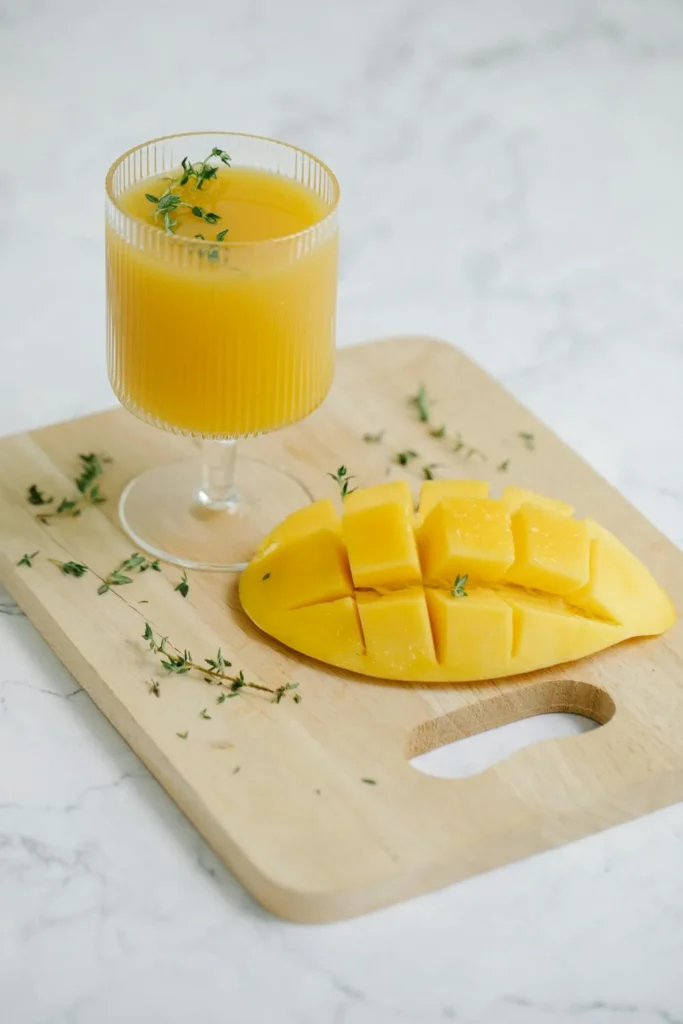There’s something irresistibly refreshing about a chilled glass of Mango Juice. It’s not just a summer favorite or a tropical indulgence—it’s a flavorful powerhouse packed with nutrients and versatility. Whether you enjoy it fresh from ripe mangoes, store-bought, or as part of smoothies, cocktails, or desserts, Mango Juice deserves a permanent spot in your fridge and your lifestyle.
In this comprehensive guide, we’ll dive deep into everything you need to know about Mango Juice—from its history and health benefits to how to make it at home, different ways to enjoy it, and how it fits into a healthy diet.
What is Mango Juice?
Mango Juice is a beverage made by extracting the liquid from ripe mangoes. Often sweet and thick, it captures the tropical essence of the fruit in liquid form. Depending on how it’s made, Mango Juice can be pulp-rich or smooth, with natural sweetness or light added sugar. It’s popular worldwide and is especially beloved in tropical and subtropical regions.
A Brief History of Mango Juice
Mangoes have been cultivated for over 4,000 years, originating in South Asia and later spreading to Africa, South America, and beyond. With the mango’s growing popularity, the practice of juicing mangoes quickly followed. In countries like India, Pakistan, and the Philippines, Mango Juice became more than just a drink—it became a cultural staple, especially during the hot summer months.
In recent decades, Mango Juice has gained popularity in the West, often found in supermarkets, juice bars, and smoothie shops. It’s now a global favorite, appreciated not just for its taste, but for its nutritional value as well.
10 Health Benefits of Mango Juice
Beyond its delicious taste, Mango Juice offers a range of health benefits. Here’s why this tropical drink is more than just a treat:
1. Rich in Antioxidants
Mangoes are full of antioxidants like beta-carotene, flavonoids, and polyphenols. These compounds help neutralize harmful free radicals in the body, protecting cells and reducing the risk of chronic diseases.

2. Supports Immunity
Mango Juice is high in Vitamin C, which plays a key role in strengthening the immune system. Just one glass can provide a significant portion of your daily Vitamin C requirement.
3. Improves Digestion
Mangoes contain enzymes like amylase that aid in breaking down carbohydrates and improving digestion. A glass of Mango Juice after a meal can help you feel less bloated and more comfortable.
4. Promotes Eye Health
Thanks to its high levels of Vitamin A and lutein, Mango Juice supports good vision and reduces the risk of age-related macular degeneration.
5. Boosts Energy
The natural sugars in Mango Juice—primarily fructose and glucose—provide a quick and lasting energy boost, making it an excellent post-workout drink.
6. Helps Hydrate the Body
Mangoes are rich in water, and when juiced, they help hydrate the body efficiently. In hot climates, Mango Juice is often consumed to replenish fluids and prevent dehydration.
7. Aids Skin Health
The Vitamin C and A found in Mango Juice contribute to collagen production, which is essential for glowing, youthful skin.
8. Alkalizes the Body
Though mangoes are sweet, they help balance the body’s pH levels by alkalizing the digestive system—a lesser-known but vital health benefit.
9. Regulates Blood Pressure
Mango Juice is a good source of potassium, which helps regulate blood pressure and supports cardiovascular health.
10. Acts as a Natural Detoxifier
Thanks to its high water and fiber content, Mango Juice aids in flushing out toxins from the body, supporting liver function and overall detoxification.
How to Make Fresh Mango Juice at Home
Making fresh Mango Juice at home is easy, delicious, and far healthier than most store-bought versions. Here’s a basic recipe to get you started.
Ingredients:
- 2 ripe mangoes (Alphonso or Ataulfo varieties are especially juicy)
- 1/2 cup cold water or coconut water
- 1–2 teaspoons honey or agave (optional)
- A pinch of salt (optional)
- Ice cubes
Instructions:
- Peel the mangoes and cut the flesh away from the pit.
- Place the mango chunks in a blender with the water.
- Blend until smooth. Add honey if needed.
- Strain the juice through a sieve if you prefer a smoother texture.
- Pour over ice and serve immediately.
This basic version of Mango Juice is naturally sweet, hydrating, and packed with nutrients. You can also add a squeeze of lime or a hint of mint for extra flavor.
Best Mango Varieties for Juicing
Not all mangoes are created equal, especially when it comes to juicing. Here are a few of the best mango varieties for making Mango Juice:
- Alphonso (India): Known for its intense sweetness and deep orange color.
- Ataulfo (Mexico): Small, buttery, and almost fiberless—perfect for juice.
- Haden (USA): Sweet with a slight tartness, good for blending.
- Kent (Peru): Low in fiber and very juicy, ideal for smooth Mango Juice.
Each variety brings its own unique flavor and texture to the juice, so don’t hesitate to try different types.
Creative Ways to Use Mango Juice
While Mango Juice is delicious on its own, it’s also an incredibly versatile ingredient. Here are some creative ways to use it:
1. Smoothies
Blend Mango Juice with bananas, spinach, and Greek yogurt for a nutritious smoothie packed with vitamins and minerals.
2. Cocktails and Mocktails
Use Mango Juice as a base for tropical drinks like mango mojitos, mango margaritas, or non-alcoholic mango spritzers.
3. Popsicles
Pour Mango Juice into popsicle molds and freeze for a healthy and refreshing treat.
4. Salad Dressings
Combine Mango Juice with olive oil, lime juice, and spices for a unique vinaigrette.
5. Baking
Add Mango Juice to cakes, muffins, or pancakes for a fruity twist.
Mango Juice vs. Mango Nectar
Many people confuse Mango Juice with mango nectar. While both are fruit-based drinks, there are key differences:
- Mango Juice is typically thinner, made by blending mango pulp with water, and sometimes strained for a smooth texture.
- Mango Nectar is thicker, sweeter, and more concentrated. It usually contains added sugar, preservatives, and sometimes other fruit concentrates.
For a healthier choice, opt for 100% pure Mango Juice, especially if you’re looking to reap the full nutritional benefits.
Is Mango Juice Good for Weight Loss?
This is a common question, and the answer depends on how and when you consume Mango Juice.
Pros:
- It’s filling due to its fiber content (if unfiltered).
- Contains natural sugars and nutrients, unlike sodas or sugary drinks.
- Can be part of a low-calorie smoothie or snack.
Cons:
- Store-bought versions may contain added sugars.
- Drinking large quantities can contribute to excess calorie intake.
If your goal is weight management, opt for homemade Mango Juice, watch portion sizes, and consume it as part of a balanced diet.
Storing Mango Juice: Tips for Freshness
Mango Juice tastes best when fresh, but it can be stored if needed.
In the Fridge:
- Store in an airtight glass container.
- Best consumed within 2–3 days.
In the Freezer:
- Pour into ice cube trays and freeze.
- Use frozen cubes in smoothies or defrost as needed.
Avoid plastic containers if possible, as they can alter the flavor over time.
Cultural Significance of Mango Juice
In many parts of the world, Mango Juice is more than just a beverage—it’s a seasonal tradition. In India, for example, Mango Juice is associated with summer festivals and family gatherings. In the Caribbean and Latin America, it’s a popular street drink, often sold fresh from fruit stands and local vendors.
Its widespread appeal across cultures is a testament to its universal flavor and nourishing qualities.
Conclusion: Why Mango Juice Deserves a Spot in Your Daily Routine
Mango Juice is one of nature’s sweetest gifts—an indulgence that’s not just delicious but also packed with nutrients. From aiding digestion and boosting immunity to serving as a versatile ingredient in countless recipes, it’s clear why Mango Juice has earned its place in households around the world.
By choosing fresh, homemade Mango Juice and exploring its many uses, you’re not only treating your taste buds—you’re supporting your health in a natural and enjoyable way. So the next time you’re at the market,
grab some ripe mangoes, whip out your blender, and start sipping the sunshine in a glass.


Pingback: "10 Powerful Benefits of Herbal Tea: The Ultimate Guide to Varieties, Uses, and Brewing Tips" - delisiousresipes.com
Pingback: "15 Amazing Benefits of Coconut Water You Need to Know Today" - delisiousresipes.com